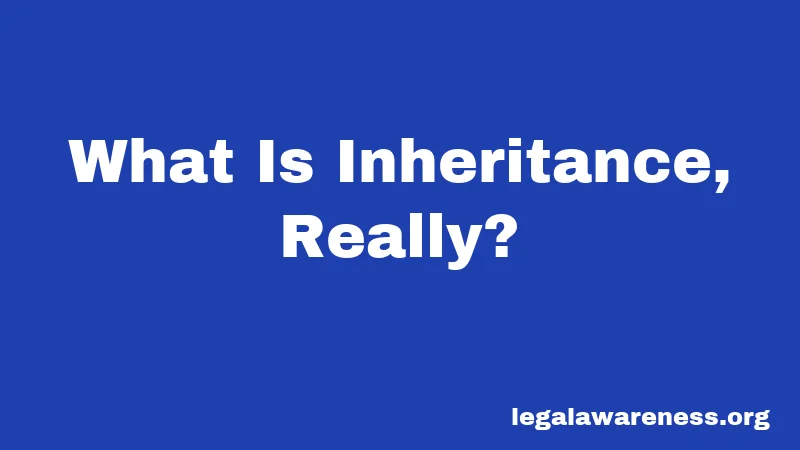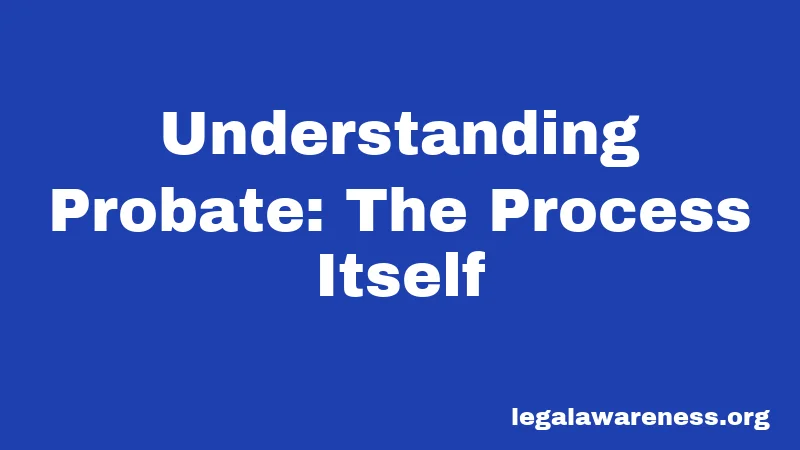California Inheritance Laws (2026): The Real Story Your Family Needs to Know
Most people have no idea how California actually handles inheritance. Seriously. They think their spouse gets everything, or they assume taxes will destroy what they leave behind. But here’s the truth: California has some pretty specific rules about how your stuff gets passed down. And honestly, understanding them now could save your family a fortune in headaches later.
This guide breaks down exactly what happens to your assets when you die in California. We’ll cover what applies if you have a will, what happens if you don’t, and those sneaky rules that catch most families off guard.
What Is Inheritance, Really?

Okay, let’s start simple. Inheritance is just the legal process of transferring what you own to other people after you die. Your house, your car, your bank accounts, your stuff. All of it gets transferred according to either your wishes (if you have a will) or California state law (if you don’t).
The process that handles all this? It’s called probate. Think of probate like a referee in a football game. It makes sure everything gets distributed fairly and according to the rules. California’s been updating these rules recently, so pay attention.
The Good News: California Has No Inheritance Tax
Wait, this one’s important. California doesn’t tax inheritances. And California doesn’t have an estate tax either. That’s a huge relief for most families.
Here’s what that means for you. When someone you care about dies and leaves you money or property, you won’t pay California state taxes on it. Not a penny. You inherit it completely tax-free at the state level.
But hold on. There’s more to this story. Federal estate tax exists, and that one’s different. If an estate is worth more than $13.99 million per person in 2025, the federal government might take a chunk. That’s a big number, though. Most California families don’t hit that limit.
The Real Thing to Watch: Property Tax Changes

Here’s where things get tricky. California changed the rules around inherited homes pretty recently.
Normally, when property changes hands, the county reassesses it for property taxes. Think of it like this: your parents bought a house in 1985 for $150,000. They leave it to you in 2026, and it’s now worth $800,000. The county used to increase your property taxes based on that new value.
There’s a newer law called Proposition 19 that still lets this happen. If you inherit a home that’s not your primary residence, the county can reassess it at current market value. That means your property taxes could jump significantly.
Here’s how to avoid that trap: if you inherit a primary residence and move into it within one year, property taxes stay low. The county won’t reassess. This applies to homes valued at fair market value, not your equity in them. Real talk? This is one of the biggest surprises that hits families.
When You Have a Valid Will
Let’s talk about what happens if someone dies WITH a will. First, here’s the legal definition: a valid will must list beneficiaries, name an executor, and be properly signed and witnessed according to California law.
When someone leaves a valid will, the process is pretty straightforward. Here’s what happens.
The executor named in the will files the document with the probate court. The court checks that the will is real and was signed properly. If it passes that test, the executor gets legal authority to manage the estate, pay off debts, and distribute assets to the people named in the will.
Think of the executor like a project manager. They’re responsible for settling all the estate’s bills, including mortgages, credit cards, medical expenses, and funeral costs. Only after everything’s paid does anyone actually get their inheritance.
Understanding Probate: The Process Itself

This is important, so stay with me. Probate can be fast or slow depending on how valuable the estate is.
Here’s the basic rule in California: if an estate is worth more than $184,500, it usually has to go through formal probate. That number is outdated, by the way. It’s from older law. The actual threshold is higher now, around $208,850 for personal property.
Recent updates to California law in 2025 made things a bit easier for smaller estates. If an estate is worth less than $208,850 in personal property, the executor can file something called an Affidavit for Transfer of Personal Property instead of going through full probate. But here’s the catch: you have to wait at least 40 days after the death.
There’s also new help for primary residences. If a home is worth $750,000 or less and it’s the main residence, heirs can use a simplified court process instead of regular probate. Again, this is brand new as of 2025.
The whole probate process usually takes anywhere from 9 months to over a year. Honestly? It can take longer. If family members fight, or the estate is complicated, expect it to drag on. Recent changes are supposed to speed things up with electronic filings and online court hearings.
When There’s No Will: Intestate Succession
Now, here’s where most people get confused. What happens if someone dies WITHOUT a valid will?
California law kicks in automatically. The state has a specific order of who gets what. This order is called intestate succession. The law basically says: “Okay, this person didn’t tell us who gets their stuff, so let’s look at their family and follow this rule.”
Not sure what counts as “no valid will”? It includes people who wrote a will but it wasn’t signed properly, or it was never witnessed correctly. It also applies to people who wrote nothing at all.
The Order of Heirs in California
Alright, this is the legal hierarchy for intestate succession. California follows a strict order, and there’s not much wiggle room.
If someone is married, the surviving spouse gets the biggest piece. Here’s the breakdown:
Surviving spouse inherits all community property (that’s anything earned or bought during the marriage). For separate property (anything owned before marriage, inherited, or received as a gift), the spouse gets a portion. If there’s one child, the spouse gets half the separate property. If there are two or more children, the spouse gets only a third.
If there’s no spouse but there ARE children, the children split everything equally. Pretty straightforward.
If there’s no spouse or children, the parents inherit. If the parents are gone too, then siblings. Then aunts, uncles, nieces, nephews. It keeps going down the family tree.
Here’s a detail most people miss: California law says you have to survive the deceased by at least 120 hours to inherit. That’s five days. So if a couple dies in a car accident and one lives for four days before passing, that person gets nothing.
Community Property vs. Separate Property
Okay, pause. This part matters. A lot.
California is a community property state. That means anything you and your spouse earn or buy during marriage is considered jointly owned. Both of you own everything equally, even if it’s just in one person’s name.
Separate property is different. That’s money or belongings you had before marriage, or things you inherited, or gifts. Your spouse has no claim to your separate property.
Why does this matter for inheritance? Because when someone dies, community property and separate property get distributed differently. Community property usually goes entirely to the surviving spouse. Separate property gets divided based on the intestacy rules.
This gets complicated fast if you’re remarried. Let’s say a husband has children from a first marriage. If he dies without a will, those kids get a portion of his separate property, and his current wife gets a portion too. Family dynamics are messy, and the law doesn’t account for emotions.
Important Rules You Didn’t Know About
There are a few special rules that affect inheritance in California. These ones catch people off guard.
Half-siblings count as full siblings. Your sister with whom you share one parent has the same inheritance rights as a sister with whom you share both parents. California law treats them equally.
Immigrants can inherit. Immigration status doesn’t matter. Whether someone is a citizen, has a green card, or is undocumented, they can inherit under California intestate succession laws.
Posthumous children can inherit. If someone was conceived before death but born after, they can inherit. There are specific conditions, but it’s possible.
The Slayer Statute exists. California has a law that says murderers can’t inherit from their victims. It’s exactly what it sounds like. If you intentionally cause someone’s death, you forfeit any inheritance, even if they named you in a will.
Assets That Bypass Probate (The Smart Move)
Here’s something really important: NOT everything goes through probate.
Certain assets pass directly to whoever’s named on them. Life insurance policies go to the beneficiary you named. Retirement accounts (like 401k’s and IRAs) go to the listed beneficiary. Bank accounts with “transfer on death” designations transfer directly. If you own a car or house with someone as a joint tenant, it goes straight to them.
These assets skip probate entirely. They don’t get held up in court. They don’t get expensive. They just transfer.
This is actually the biggest secret to avoiding probate. If you properly name beneficiaries on everything, a huge chunk of your estate can skip the entire probate process. Most people don’t do this, and it costs their families thousands.
What About Trusts?
Assets held in a living trust also skip probate. That’s why trusts have become so popular in California.
A living trust is a legal document that holds your assets during your life and transfers them after you die. You can change it anytime. You can access your money whenever you want. But after you pass, everything in the trust transfers to whoever you named, without probate.
Honestly, this is probably the smartest move for most California families, especially ones with real estate or decent savings. It keeps things private, avoids probate delays, and gives you total control.
Federal Estate Tax: The Ticking Time Bomb
This is critical. Pay attention to this part.
Right now, in 2025, you only have to pay federal estate tax if your estate exceeds $13.99 million per person. That’s a huge number. For most families, this isn’t a concern.
But here’s the problem: that number is scheduled to drop in 2026. Without new congressional action, the exemption could fall to around $7 million per person. Suddenly, more families would owe federal taxes. Federal estate tax is brutal. It’s 40% of everything above the limit.
A wealthy California couple with a paid-off home in an expensive neighborhood plus retirement savings could easily exceed $7 million. If you’re in that ballpark, this deserves serious attention now. Don’t wait. Talk to an estate planner or financial advisor about strategies to minimize this.
New 2025 Changes That Help Some Families
California recently passed reforms to make probate less painful. Here’s what changed.
Starting April 1, 2025, more estates qualify to skip full probate. Personal property thresholds increased to $208,850. That’s a decent jump. Many families now qualify for the simplified Affidavit process instead of court probate.
Primary residences valued at $750,000 or less can use a simplified succession petition instead of traditional probate. The court still gets involved, but it’s faster and less formal.
Electronic filings and online hearings are now standard. Mandatory mediation helps resolve disputes without litigation.
These changes are good. They reduce costs and delays for ordinary families. But don’t assume they make probate disappear. You still might need an attorney. Court fees still apply. It’s just less painful than before.
Penalties for Not Following the Rules
California takes inheritance law seriously. If you’re an executor or administrator, breaking these rules has real consequences.
Executors have what’s called a “fiduciary duty.” That means they have a legal obligation to act in the beneficiaries’ best interest. If they don’t, they can be personally liable. That’s not a threat. That’s reality.
If an executor steals from the estate, diverts assets, or doesn’t follow the instructions, beneficiaries can sue them personally. The court can force them to repay everything plus interest. Judges don’t mess around with this.
Stepped-Up Basis: The Tax Benefit You Might Not Know About
Here’s a valuable tax concept. When you inherit property, its tax basis gets reset to its fair market value on the date of death.
Remember that example? Parents bought a house for $150,000 in 1985. You inherit it worth $800,000. Your new cost basis is $800,000. If you sell it immediately, you don’t pay capital gains tax. You’d only owe taxes on any appreciation after you inherit it.
This is a massive benefit. It means inherited assets don’t carry the original owner’s tax burden. Your basis “steps up” to current value. That’s worth understanding.
What Happens If Someone Dies Without Any Heirs
This is rare, but it happens. If someone dies and California can’t find ANY heirs, the estate goes to the state. It’s called escheatment. The state basically becomes the heir.
California’s courts make serious efforts to locate relatives before this happens. They’ll look for distant cousins, second cousins twice removed, whoever. But if absolutely nobody can be found, the money goes to the state.
This almost never happens because most people have some family somewhere. But it’s worth knowing.
How to Report Someone’s Death in California
So, what do you actually need to do if someone dies?
First, get multiple copies of the death certificate. You’ll need certified copies for basically everything. Banks, insurance companies, the court. Get 10 or 15 copies. You’ll use them.
If the estate requires probate, the person serving as executor files a Petition for Probate with the Superior Court in the county where the deceased lived. This starts the whole process.
If the estate is small enough for the Affidavit process, that gets filed instead. It’s simpler, but you still need documentation and dates.
For estates with property in multiple counties, things get messier. California law allows “ancillary probate” for out-of-state property. But basically, if you inherit real estate in another state, that state’s laws might apply too.
Special Circumstances: Remarriage and Stepchildren
This is where California inheritance law gets tricky. California recognizes stepchildren and foster children differently than many states.
If someone officially adopted a stepchild or foster child, that child has full inheritance rights. They’re treated like biological children. Period.
If someone didn’t formally adopt them but treated them as their own? The law gets fuzzy. Sometimes courts will recognize them as heirs, sometimes not. It depends on evidence of intent.
This causes a lot of family conflict. A stepparent dies, and suddenly the biological children and stepchildren fight over who’s actually entitled to inherit. Without a will clarifying intentions, these cases go to court.
The real lesson: if you want stepchildren or foster children to inherit, put it in writing. Don’t assume the law will figure it out.
Updating Beneficiaries After Life Changes
Here’s something practical. When life changes, beneficiaries need updating.
You get married? Update your will, update your beneficiaries on retirement accounts and insurance. You get divorced? Do the same. You have a kid? Update everything. You receive an inheritance that changes your financial picture? Talk to an estate planner.
People think their old documents still apply. They don’t. When you die, only the current documents matter. If your insurance still names your ex-spouse as beneficiary because you never updated it, your ex gets the money. Not your kids. Not your current spouse. Your ex.
This sounds simple, but it destroys families regularly. Take an afternoon and update your stuff. Seriously.
Questions People Actually Ask
Do I have to go through probate if I have a will? Not necessarily. It depends on the estate size. Small estates under $208,850 can use the Affidavit process. But if the estate is larger, yes, probate happens. Having a will doesn’t guarantee you avoid it.
Can my spouse leave everything to someone else and cut me out? In community property, not really. The surviving spouse automatically inherits all community property regardless of what a will says. But for separate property, yes, a spouse can legally exclude you. Which is why that prenup conversation matters.
What if someone dies with debts? Who pays them? The estate pays them before anyone gets their inheritance. That’s why some heirs end up with less than expected. Creditors get priority.
Can I contest a will? Yes, but it’s complicated and expensive. You have to prove the will wasn’t valid, the person lacked mental capacity, or someone committed fraud. Most contests fail. California courts don’t easily overturn valid wills.
What happens to jointly owned property? It goes straight to the other owner, bypassing probate and intestacy rules. Joint ownership is one of the smartest ways to avoid probate drama.
Do grandchildren inherit if their parent already died? Yes, under something called “representation.” If a son dies before his father, the son’s kids (the grandchildren) inherit their father’s share. It’s like the deceased son is still passing his inheritance down.
Final Thoughts
California inheritance law isn’t overly complicated once you understand it. The real power is planning ahead.
Have a will or trust. Name beneficiaries on everything. Update those beneficiaries when your life changes. If you’re wealthy, talk to a professional about federal estate tax planning. Don’t just assume everything will work out.
The families that avoid probate drama, legal fees, and surprise taxes are the ones who plan. The families that struggle are the ones who ignore it.
You now know the basics. When in doubt, look it up. Talk to a lawyer. Your family will thank you for it.
References
- California Probate Code Sections 6400-6455 (Intestate Succession)
- California Government’s Probate and Estate Planning Information
- Assembly Bill 2016 (2025 Probate Reforms)
- California Department of Revenue: Estate and Inheritance Tax Information
- Proposition 19: Reassessment of Inherited Property
- IRS Federal Estate Tax Information
